 ResearchSpace
ResearchSpace
The feasibility of low cost algae-based sewage treatment as a climate change adaption measure in rural areas of SADC countries
JavaScript is disabled for your browser. Some features of this site may not work without it.
- ResearchSpace
- →
- Research Publications/Outputs
- →
- Conference Publications
- →
- View Item
| dc.contributor.author |
Oberholster, Paul J

|
|
| dc.date.accessioned | 2018-09-20T14:15:13Z | |
| dc.date.available | 2018-09-20T14:15:13Z | |
| dc.date.issued | 2018-07 | |
| dc.identifier.citation | Oberholster, P.J. 2018. The feasibility of low cost algae-based sewage treatment as a climate change adaption measure in rural areas of SADC countries. 31st Congress of the Phycology Society of Southern Africa, 14-17 July 2018, Gauteng, South Africa | en_US |
| dc.identifier.uri | https://sanpcc.org.za/pssa/annual-conference/ | |
| dc.identifier.uri | http://hdl.handle.net/10204/10415 | |
| dc.description | Presentation delivered during the 31st Congress of the Phycology Society of Southern Africa, 14-17 July 2018, Gauteng, South Africa | en_US |
| dc.description.abstract | Employing specific algae treatment to treat municipal domestic waste water effluent presents an alternative practice to improving water quality effluent of existing rural pond systems in Southern Africa. In the present study domestic waste water was treated using inoculated algae strains in two rural waste water pond system treatment plants. The novelty of the technology is the consortium of specific algae that were selected on the bases of robustness, maximum abortion of nutrients. Other algae and conventional technologies on the market currently required high cost investment, requires electricity for mixing of algae and need skill labours to maintain the system. The objective of the current study was to determine through field pilot studies, if algae nutrient treatment efficiencies in prevailing traditional waste stabilization ponds can be optimize through the manipulation of the existing natural consortium of alga by the mass inoculation of specific algae strains. One of the mean concerns using specific strains of algae in SADC countries, are temperature requirements of the selected strains. Temperature variations due to climate change can affect biochemical reactions and subsequently biochemical composition of algae. The current study did show that inoculations of specific algal strain can potentially enhancing the treatment efficiencies of existing rural domestic sewage pond systems. | en_US |
| dc.language.iso | en | en_US |
| dc.relation.ispartofseries | Worklist;21304 | |
| dc.subject | Green technology | en_US |
| dc.subject | Domestic waste water | en_US |
| dc.subject | SADC | en_US |
| dc.title | The feasibility of low cost algae-based sewage treatment as a climate change adaption measure in rural areas of SADC countries | en_US |
| dc.type | Conference Presentation | en_US |
| dc.identifier.apacitation | Oberholster, P. J. (2018). The feasibility of low cost algae-based sewage treatment as a climate change adaption measure in rural areas of SADC countries. http://hdl.handle.net/10204/10415 | en_ZA |
| dc.identifier.chicagocitation | Oberholster, Paul J. "The feasibility of low cost algae-based sewage treatment as a climate change adaption measure in rural areas of SADC countries." (2018): http://hdl.handle.net/10204/10415 | en_ZA |
| dc.identifier.vancouvercitation | Oberholster PJ, The feasibility of low cost algae-based sewage treatment as a climate change adaption measure in rural areas of SADC countries; 2018. http://hdl.handle.net/10204/10415 . | en_ZA |
| dc.identifier.ris | TY - Conference Presentation AU - Oberholster, Paul J AB - Employing specific algae treatment to treat municipal domestic waste water effluent presents an alternative practice to improving water quality effluent of existing rural pond systems in Southern Africa. In the present study domestic waste water was treated using inoculated algae strains in two rural waste water pond system treatment plants. The novelty of the technology is the consortium of specific algae that were selected on the bases of robustness, maximum abortion of nutrients. Other algae and conventional technologies on the market currently required high cost investment, requires electricity for mixing of algae and need skill labours to maintain the system. The objective of the current study was to determine through field pilot studies, if algae nutrient treatment efficiencies in prevailing traditional waste stabilization ponds can be optimize through the manipulation of the existing natural consortium of alga by the mass inoculation of specific algae strains. One of the mean concerns using specific strains of algae in SADC countries, are temperature requirements of the selected strains. Temperature variations due to climate change can affect biochemical reactions and subsequently biochemical composition of algae. The current study did show that inoculations of specific algal strain can potentially enhancing the treatment efficiencies of existing rural domestic sewage pond systems. DA - 2018-07 DB - ResearchSpace DP - CSIR KW - Green technology KW - Domestic waste water KW - SADC LK - https://researchspace.csir.co.za PY - 2018 T1 - The feasibility of low cost algae-based sewage treatment as a climate change adaption measure in rural areas of SADC countries TI - The feasibility of low cost algae-based sewage treatment as a climate change adaption measure in rural areas of SADC countries UR - http://hdl.handle.net/10204/10415 ER - | en_ZA |





